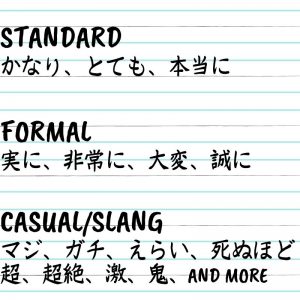Did you know that there are more than 20 pronouns in Japanese? This article explains their meanings and differences in detail!
(If you’re fond of exploring Japanese synonyms, check my tool: Japanese Synonym Finder)
First-Person Pronouns
First, I introduce Japanese first-person pronouns (i.e. “I” in English). There are so many ways of saying “I” in Japanese, and each of them has a very different tone.
私 (わたし, “watashi/atashi”)
私 is the most general/common 1st person pronoun, esp. for women (but men use 私, too). It’s also used in writing/formal speech (e.g. essay, column, job interview) regardless of gender. In a casual conversation, some girls pronounce it as あたし (atashi), and it sounds much more feminine/casual than わたし.
(cf.) There is a Japanese anime named “あたしンち (Atashin’chi)”, which is a casual way of saying 私の家(いえ), meaning “my home”
Example
私は大学(だいがく)で日本語 (にほんご)の勉強(べんきょう)しています。
I study Japanese at university
あたしは大丈夫 (だいじょうぶ)!
I‘m fine.
うち/ウチ (“uchi”)
うち (“ち” is accented) is a casual 1st person pronoun that is predominantly used by young girls (teens~early 20s). It sounds very casual, young and feminine, and is often used in the Kansai region (e.g. Osaka, Kyoto). Similarly, うちら meaning “we” is also used among girls.
Example
うちそれめっちゃ好き!
I love it so much!
ウチらめっちゃ仲良くね?
We‘re so close, aren’t we?
* うち also refers to an in-group member (e.g. family, company, team)
うちの子 (こ) が迷惑(めいわく)かけてすみません
I’m sorry for my/our son/daughter causing trouble to you
** うち also means “one’s house”
うちに来(こ)ない?
Do you wanna come to my house?
僕 (ぼく, “boku”)
僕 is one of the most common 1st person pronouns for men. Compared to 俺 (to be explained below), 僕 sounds more modest, reserved, polite, and a bit smart. In a formal situation (e.g. a job interview), most men use either 私 or 僕.
* Some women use 僕 as well. In anime/manga, they are often called “ボクっ娘(こ) (bokukko)”, and some people have a fetish for them. In texts (e.g. manga/subtitles), 僕 is often written in katakana (ボク) when it is used by girls.
Example
僕は知(し)らないです
I don’t know
(ボクっ娘): 君(きみ)みたいな人(ひと)、ボクは好(す)きだな
(Bokukko): I like people like you.
俺 (おれ, “ore”)
俺 is one of the most common 1st person pronouns for men. Compared to 僕, it sounds more casual, masculine, and slightly coarse. Men often use 俺 in a casual conversation with their close friends, but some people use 僕 if they are more of a reserved kind of person or don’t like coarse expressions at all.
Example
俺は知 (し) らねえ
I don’t know.
自分 (じぶん, “jibun”)
自分 is a 1st person pronoun that sounds masculine, polite, and modest. In the Kansai region, however, it also means “you”, and in this case, it sounds casual and a bit coarse (therefore some people find it a bit rude/too friendly).
Example
自分は言(い)ってないです:
I didn’t say
(In the Kansai region)
自分、どこの大学なん?
Which uni are you in?
* As you may know, 自分 is more commonly used as “oneself”.
自分でやるって言(い)ったでしょ?
You said you’d do by yourself, didn’t you?
ワイ (“wai”)
Originally, ワイ is an old-fashioned 1st-person pronoun used by old men in the Kansai region. On the internet, however, it is also used by young people (both men and women) very casually/humorously. Furthermore, while it is not very common yet in general, some teenage girls have started using it in real life recently as a playful expression, which sounds quite bizarre for middle-aged Kansai people given its original usage.
Example
(Kansai)
ワイは行(い)かへんわ
I won’t go
(行かへん means 行かない in standard Japanese)
(On the internet)
ワイ、大学 (だいがく) で友達 (ともだち)が出来(でき)ず辛(つら)い
I’m pretty sad coz I couldn’t make any friends at uni
ワイも行きたい!
I wanna go, too!
ワシ (“washi”)
ワシ is also an old-fashioned 1-person pronoun used by elderly people. However, similar to ワイ, it is also used by young people on the internet as a casual and playful expression.
ワシはもう疲れた
I‘ve got tired already.
Your Name
Some young girls use their first name instead of a pronoun to refer to themselves. This sounds very young and casual, and some people have a negative opinion about it (like it sounds selfish, childish or acting cute). Therefore, it can sound a bit cringy if adults refer to themselves using their names.
Example
ゆみは行きたくないなぁ
I (Yumi) don’t wanna go.
Other 1st Person Pronouns
- 小生 (しょうせい, “shousei”) masculine, extremely humble
- 私め (わたくしめ, “watakushime”): masculine, overly humble (slavish)
- 俺様 (おれさま, “ore sama”): masculine, king-ish
- おいら/オラ (“oira/ora”): masculine and childish (e.g. オラ is often used by the anime character “Crayon Shin-Chan”)
- 拙者 (せっしゃ, “sessya”): used by Ninja
- まろ: used by anime characters in the ancient era
- 我輩 (わがはい, “wagahai”): masculine, old, bossy, pompous
* There’s a well-known and traditional Japanese book called “吾輩は猫である” (“I Am a Cat”), written by Soseki Natsume, a famous novelist who was portrayed on the former 1000 yen banknote. People often cite this book title to indicate how difficult it can be to translate the nuances of Japanese words into English (i.e. all the Japanese first-person pronouns explained so far end up being translated as “I” in English)
Speaking of Soseki Natsume; there is a funny story about him that you may like; “The moon is beautiful, isn’t it?” Could Mean “I love You” in Japanese
Second-Person Pronouns
Next, I introduce Japanese second-person pronouns (“you” in English). However, note that none of them sounds very friendly; therefore, it’s safer for Japanese learners to refer to someone using their (nick)name, or simply omit the pronoun.
あなた
あなた is the most common 2nd-person pronoun. However, it can sound a bit aloof/unfriendly/rude in a conversation, so it’s better to avoid using it.
Example
(あなたは)どこにいましたか?
Where are you?
* It is also used as “darling” to call one’s husband. In this case, it sounds very intimate.
あなた、晩(ばん)ご飯(はん)出来(でき)たわよ!
Darling, the dinner is ready!
君 (きみ)
君 is another 2nd-person pronoun. It has a condescending/bossy tone, so it can sound very rude depending on whom you’re talking to.
Example
君は何(なに)を大学(だいがく)で勉強(べんきょう)したのかな?
What did you study at university?
君の話(はなし)は面白(おもしろ)いね
Your talk is interesting.
お前(まえ)
お前 is a very casual 2nd-person pronoun that sounds aggressive, coarse, and masculine. Usually, it is used in the following situations:
- used by men when talking to their close friends
お前は何(なに)飲(の)む?
“What are you gonna drink?”
- used when you are fuming/aggressive; in this case, some women also use it but that sounds very coarse/frightening.
おいお前、それやめろって言っただろ
“Hey you, I said stop it”
* According to some online surveys, many women feel annoyed when their boyfriends call them “お前” because it sounds condescending. Therefore, it’s safe not to use お前, especially in the following cases:
- if you are a woman (as its tone is masculine)
- if you refer to a woman
- if you refer to a man who is older than or not very close to you
お主(おぬし, “onushi”)/そなた (“sonata”)/そち (“sochi”)
お主/そなた/そち are traditional Japanese 2-nd person pronouns. They have a condescending tone and are often used by high-ranking people in period dramas/animes.
Example
お主の望(のぞ)みを叶(かな)えてやろう
I’ll let your wishes come true.
Thrid-Person Pronouns
Lastly, I introduce third-person pronouns (i.e. “he” and “she” in English). As in 2nd person pronouns, all of them sound a bit aloof/unfriendly in speech, so it’s better not to use them in a conversation with your friends.
彼 (かれ, “kare”)/彼女 (かのじょ, “kanojo”)
彼 and 彼女 are 3rd-person pronouns that mean “he/she”. However, 彼女 is more commonly used as a word meaning “girlfriend”. Similarly, 彼 also means “boyfriend”, but 彼氏 (かれし) is more commonly used.
Example
(talking about someone not present)
彼/彼女は子供 (こども) だからねぇ:
Well, he/she is childish, so…
彼氏/彼女が超(ちょう)かわいい
My boyfriend/girlfriend is so cute.
あいつ (“aitsu”)
あいつ is a 3rd-person pronoun that contains a coarse (and often hostile, but not always) tone.
Example
あいつのせいで失敗 (しっぱい) した
I failed because of him/her
あいつ、すげえな
He/She is unbelievable!
誰かさん (だれかさん, “dareka-san”)
誰かさん literally means “Somebody-san”, and is used when you refer to someone “anonymously” in a sarcastic/ironic way.
Example
誰かさんが遅刻 (ちこく)したから、電車(でんしゃ)に乗(の)り遅(おく)れたよ
Because “somebody-san” came late, we missed the train



Leave a Reply